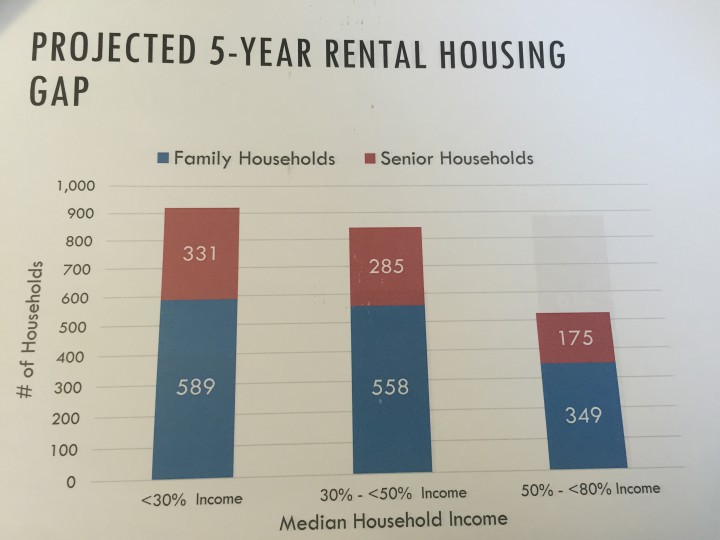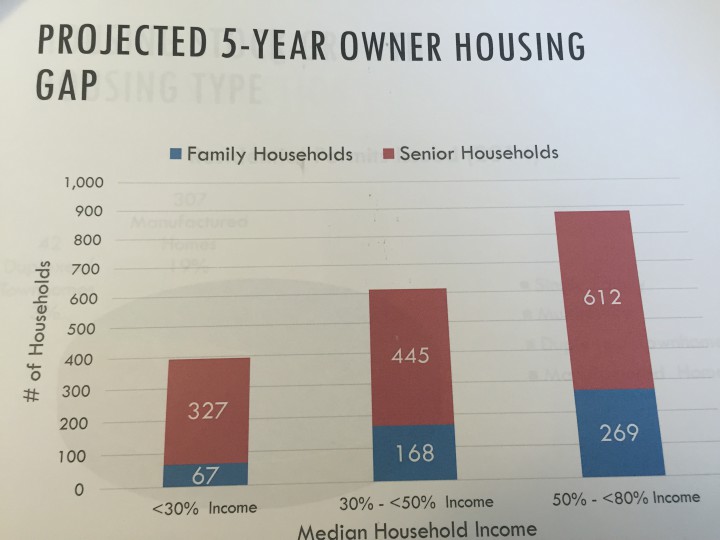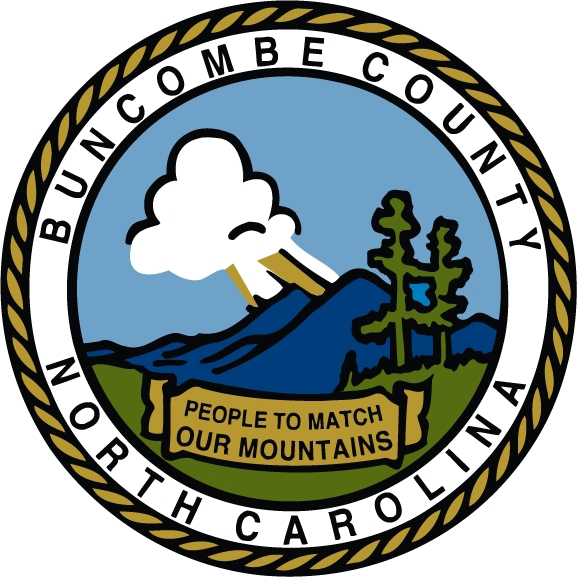At the Buncombe County Board of Commissioners’ March 17 retreat, the planning department gave two separate presentations, each containing proposed actions to be discussed at future meetings.
Prior to the meeting, the board entered a closed session for 45 minutes for an emergency meeting on an economic development issue, wrote Kathy Hughes, clerk to the board, in an email.
Following the private session, the commissioners returned to the first floor meeting room and were promptly presented the first of two proposals from the Buncombe County Planning and Development Department. Director Jon Creighton, Zoning Administrator Debbie Truempy and Recreation Services Manager Josh O’Conner (previously zoning administrator), briefed commissioners on the many zones in the county, what structures those zones allow and the topographical concerns that come with building in a mountainous area.
The planning department then presented possible actions that may come before the county commission at future meetings.
Proposed actions included zoning the county’s “donut holes,” the creative name for unzoned properties surrounded by municipal lands.
“Previously, in order to zone an area, the area being zoned had to be at least 10 separate tracts of property or 640 acres,” O’Conner, who presented the proposals, explained to Xpress. “When we applied county-wide zoning, there were some pockets that we were not able to [zone] because they were surrounded by other municipal boundaries, usually ETJs.”
Basically, O’Conner said, it was “a no-man’s-land between several jurisdictions, which essentially locks us out of being able to zone a property.” However, a 2013 North Carolina bill “changed the law where previous size requirements for donut holes no longer applied to Buncombe County.”
In closing the donuts, O’Conner explained, the planning board asks the commissioners “to apply some type of zoning, because while we technically have county-wide zoning, there are a few pockets that remained unzoned because of this previous issue,” and the areas are therefore open to unrestricted land use.
Because no decisions were made and no votes were cast at the retreat, the commissioners agreed to pick up the conversation at a later regular meeting and moved on to the next bullet point: creating a business district overlay, which allows for alternative land development requirements.
Specifically in areas such as Swannanoa and Candler, where commissioners said residents are working hard to revitalize the community, adding a business district might jump-start citizens efforts for economic growth and activity.
Commissioners Ellen Frost and Holly Jones agreed that a business district would go along with what’s been voiced from the communities. However, Commissioner Brownie Newman noted that the districts should be planned separately to account for the unique needs of the two towns — rather than blanketing the definition of “business district” under one umbrella.
Commissioner Joe Belcher expressed his concerns with enforcing the regulations the county already has in place, saying even more rules and regulations may muddle the line even further.
In favor of the proposal, Jones added, “Given what I know about the interests of people in Swannanoa, they’re proactive about [building] a corridor with attention and some forward thinking, [which] can be a place that can generate more economic activity. I would be supportive of pursuing a business district overlay. … That could be our pilot, to see where it goes from there.”
The next bullet point that garnered attention was to allow Department of Housing and Urban Development-labeled manufactured homes in all districts, increasing availability of low-cost housing in Buncombe County.
Belcher proposed, as a compromise, that manufactured home parks should stay in the R-3 and R-LD (low density) districts, but single manufactured homes could apply for variance applications in single-family R-1 and multi-family R-2 districts.
The board then discussed the possibility of setting up additional regulations for manufactured homes in R-1 and R-2 districts, but Frost added, “How is it fair to set conditions for new homes that don’t apply to old homes?”
After much back and forth, the commissioners decided to move on, as discussion on the topic could potentially go on for hours, and there were many more points to consider.
The planning department addressed a need for increased protections along the Blue Ridge Parkway overlay — to which board chair David Gantt said, “There are places [along the viewshed] in Virginia that people have developed, and essentially they’ve created dead zones on the Blue Ridge Parkway. They built right along the edges, and I just think that we should protect [the parkway] to the extent that it deserves.”
The conflict here, he continued, is that “people have the right to build on their properties, but the Blue Ridge Parkway is a special case, and it should be treated as such.”
Other topics brought up by the planning department included regulating commercial development in open use areas, developing planned unit developments based on use and impact, increasing the density for affordable and workforce housing developments, decreasing the density for large tracts of land with public utilities and applying detailed zoning when sewer service is extended to an area.
Most of the discussion around the last few topics centered around the impact a high-density complex would have on rural areas — from the water supply to the roads, which are often narrow, weathered or sinuous.
The second of the two presentations, on affordable housing, was introduced by Donna Cottrell, planning department accountant and planner.
Cottrell rattled off statistics about income and affordability in Buncombe County: The area’s median household income for one person is $32,200. For two it’s $44,800. Three, $50,400, and so on. In the county, based on the median 2-bedroom rental price of $916 per month, the minimum income required to afford a home is $40,450 — a bar that many occupations often cannot meet (examples include firefighters, childcare workers, wait staff and construction workers, to name a few).
The financial requirements for purchasing a house are even higher. With the median home price in the area at $215, 000, a household must make a minimum of $67,188 to afford a home — $22,388 higher than the area’s median income.
Cottrell mentioned that 44.5 percent of renters are cost burdened, meaning they spend more than 30 percent of their income on housing. Even more distressing, she said that 21.7 percent of renters are severely cost burdened, meaning more than half of their income goes toward housing.
 As for homeowners, 26 percent are cost burdened while 9.9 percent are severely cost burdened.
As for homeowners, 26 percent are cost burdened while 9.9 percent are severely cost burdened.
She also spoke about the housing gap in the county, projecting the gap of both rentals and owners over the next five years based on income.
In 2014, Buncombe County, Asheville and Black Mountain issued 905 single-family building permits, 390 multifamily permits, 307 manufactured home permits and 42 duplex or townhome permits. At the same time, the construction of new homes in those three areas increased from 708 in 2012 to 947 in 2014.
The planning department’s assessment from all of this information is that there is a continued need for multifamily rental units, a continued need for workforce housing, more ways to make housing affordable and a growing need for senior housing — whether it’s assisted living homes, independent units or nursing homes.
As Ashevilleans and residents of Buncombe County are aware, housing is a serious issue within the community.
“I mean, less than 1% vacancy?” Jones says. “The supply just does not exist where we need it to. To me, this is the No. 1 issue in our community.”
Newman adds, “There’s actually more, new affordable homes built in our county than in any other county — Raleigh, Charlotte, much bigger areas. But the scope of demand is much worse here. The numbers right now — we’re just not winning it. I’m interested in looking into the options, and I wonder if we should be looking at other, national programs out there [to get an idea of] what we should be developing.”
The board then decided to push the nonprofit budget requests back to Tuesday, April 21, at noon, mentioning the entire process — the 45 nonprofits presenting their needs for county assistance — will take around four to four and 1/2 hours.
The meeting was rounded out by the vision for the Family Justice Center, a new government-run facility that will council, aid and represent victims of domestic violence.
Several board members expressed their happiness with the progress of the new center, which will be located at 35 Woodfin St.
“It’s going to be phenomenal,” says County Manager Wanda Greene.
The Buncombe County Board of Commissioners will hold its next meeting on Tuesday, April 7, at 4:30 p.m. on the third floor of 200 College Street.



The city has rules that do not serve it in creating new housing. In fill can be done to increase density if the city would relax the rules on flag lots and right of way driveway lots. Sometimes their rules mean a home owner or developer has to go through awkward convolutions that make the process prohibitively expensive. Whereas the city waives many of those rules for bigger developers. It’s an uneven playing field that doesn’t serve the city.
All of us have encountered situations in which persuasion has been used, by ourselves or performed on us. We have seen positive, confident speakers swaying a companion, a group, even a crowd. Successful actors employ persuasive techniques to achieve the necessary suspension of disbelief, while physicians throughout the ages have used such techniques in place of, and now alongside, surgical and analgesic therapies.
Rayban Frames Sunglasses http://frutaonline.com/reg/Rayban-Frames-Sunglasses.html